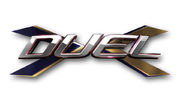Duel (U.S. game show)
| Duel | |
|---|---|
 |
|
| Genre | Quiz show |
| Developed by | BermanBraun Rocket Science Laboratories French TV |
| Directed by | Mark Gentille |
| Presented by | Mike Greenberg |
| Composer(s) | David Vanacore |
| Country of origin | United States |
| No. of seasons | 2 |
| No. of episodes | 16 |
| Production | |
| Executive producer(s) |
Gail Berman Lloyd Braun |
| Running time |
≈61 minutes (Dec. 17-18) ≈44 minutes (All other episodes) |
| Release | |
| Original network | ABC |
| Picture format | NTSC (480i) |
| Original release | December 17, 2007 – July 25, 2008 |
| Chronology | |
| Related shows | Duel (UK version) |
| External links | |
| abc |
|
Duel is an American game show hosted by Mike Greenberg that first aired from December 17 to December 23, 2007 on ABC. The show aired as a week-long six-episode tournament at 8:00 PM (7:00 Central) from Monday through Friday with the finale on Sunday.
The show's website described the program as a cross between Who Wants to Be a Millionaire? and the World Series of Poker. The game was played in a head-to-head format in which contestants answered general trivia questions, with wrong answers contributing to a growing jackpot. The winner of the Duel jackpot of $1,720,000 was Ashlee Register, whose grand total was nearly $1.8 million when combined with previous winnings, making her the highest-winning female game show contestant in the U.S.
The second season aired in a weekly format with modified rules from April 4 to July 25, 2008 at 9:00 PM (8:00 Central).
Both seasons were sponsored by Diet Pepsi Max led by Russell Findlay, the Pepsi marketing executive who launched Pepsi Max in the USA
Each player began a duel with ten chips, each worth $5,000 (for a combined total of $50,000). Before each question was asked, a screen rose between the contestants to hide their answers from each other. The duel always began with the catchphrase "Let's Duel!" before the question was heard. Each question was multiple choice with four choices. The question was read by the host while the contestants used their chips to cover choices, one chip per choice. They were allowed to cover any number of choices, provided they had enough chips. After both players had locked in their answers, the screen was lowered so contestants could see each other's choices, and the correct answer was then revealed. All chips placed on wrong answers were collected and their value was added to a jackpot.
While the questions normally had no time limit, a contestant who had already locked in his/her answers could "press" the opponent and impose a seven-second time limit, after which answers would be automatically locked in. Each contestant was given two presses per duel.
...
Wikipedia
